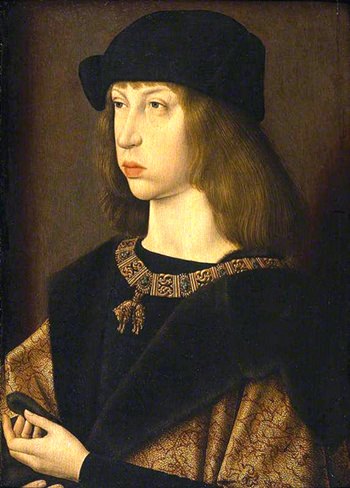
King Philip I of Castile, also known also as Philip the Handsome, had a short reign. At the age of twenty-eight, just two months and thirteen days after being crowned, he succumbed to typhoid fever. At the time, there were malicious rumours that he had been poisoned by his father-in-law Ferdinand II of Aragon who, you may recall, sponsored the first voyage of Christopher Columbus in 1492.
I mention all this because sometime during his brief reign, King Philip evidently requested that a book be compiled to contain music by the finest Flemish composers of the day. In the Middle Ages such a book took the form of a “codex”, a large format hand-written volume made from separate sheets of paper or vellum and bound by fixing one edge of each page. The codex was often illuminated with elaborate designs and lettering. It superseded the scrolls of ancient times and was a step towards the printed book as we know it.
The request by King Philip resulted in the creation of the so-called Chigi Codex, compiled between 1498 and 1503 in Flanders, the most important cultural centre of the early Renaissance. The Chigi Codex is remarkable for its beautifully coloured illuminations and also for its remarkably clear music notation. It’s one of the most elaborate codices ever produced and currently languishes in the Vatican Library. Needless to say, it is priceless.
Much of the music composed during the Middle Ages was for voices and intended for religious purposes. Although heads of state such as Philip I commissioned musical collections, the church was the principal institution that made itself responsible for recording music in written form. Without these laboriously-copied manuscripts, we would have little idea today of what medieval music actually sounded like.
The Chigi Codex contains fifteen works by Johannes Ockeghem and two works by Josquin des Prez, two of the leading composers of the fifteenth century.
Johannes Ockeghem (c.1410-1497): Intemerata Dei Mater. The Mirandola Ensemble dir. Scott Sandersfeld (Duration: 07:38; Video: 1080p HD)
Nothing is known about the composer’s early life. We aren’t even sure of the year of his birth. It could have been any time between 1410 and 1425. However, he became the most famous and most influential composer of the Franco-Flemish School in the latter half of the fifteenth century. Johannes Ockeghem (yo-HAHN-nuss O-keh-hemm) was not only a renowned composer but also a celebrated singer, choirmaster and teacher. He wasn’t a particularly prolific composer and has to his name fifteen mass settings and a couple of dozen motets and chansons for small vocal ensembles. However, it’s reasonable to assume that over the course of six hundred years some of his work may well have been lost.
The remarkably expressive Intemerata Dei Mater appears in the Chigi Codex and it’s a non-liturgical motet in praise of the Virgin Mary possibly written in 1487 and scored for five unaccompanied voices. It’s a work of quiet, reflective beauty in which the meaning of the words is reflected in the music. Notice for example at 05:06, how the music takes on a sad, plaintive quality for the words “look upon us”.
Ockeghem died in the French city of Tours. To commemorate his death, Josquin des Prez composed an obituary motet of lamentation, one of an unusually large number of obituary motets which appeared after the death of Ockeghem.
Josquin des Prez (1455-1521): La déploration de la mort de Johannes Ockeghem. Salicus Kammerchor cond. Genki Sakurai (Duration: 06:26; Video: 2160p Ultra HD)
We know precious little about the early life of Josquin des Prez, often known simply as Josquin and nothing about him as an individual. It’s possible that as a young man, he studied composition with Ockeghem. Josquin des Prez (ZHAWS-keh day PRAY) lived during what must have been a stimulating time, because musical styles were changing rapidly, partly due to the increasing mobility of composers and musicians around Europe.
This beautiful lament is a setting of a poem by Jean Molinet entitled Nymphes des Bois (“Nymphs of the Wood”). Appropriately, Josquin imitated elements of Ockeghem’s musical style and this expressive work is characterized by rich harmonies, purity of sound, soaring melodic lines and imaginative word-painting. In some ways it sounds ahead of its time.
Josquin is widely considered by music historians to be the greatest composer of the age. Martin Luther wrote about his fame and some contemporary theorists considered that his style represented musical perfection. He was so admired that many compositions by lesser composers were attributed to him, presumably to increase sales of their own music.
Despite its odd Latin-Germanic name, Salicus Kammerchor hails from Japan. The singers give a sensitive and beautifully shaped performance of this moving work which still speaks to us poignantly from across the centuries.
 |
 |
 |





